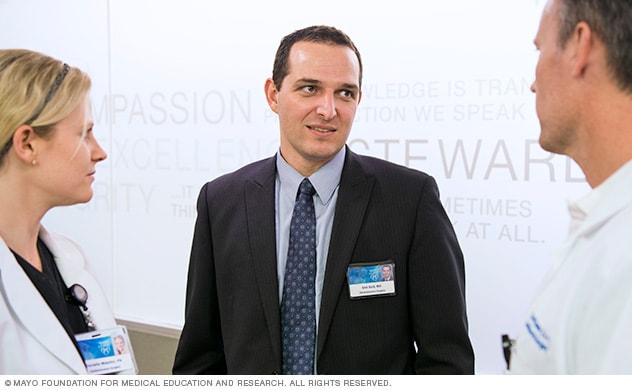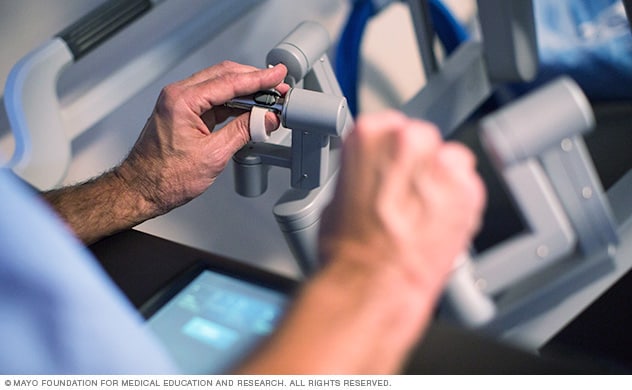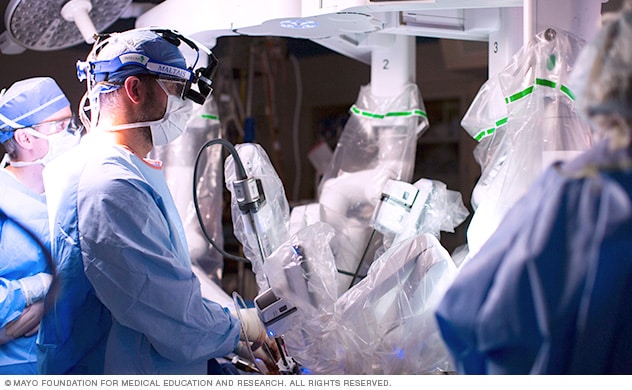Mayo Clinic's approach
Mayo Clinic cardiovascular surgeons work with cardiologists and other healthcare professionals to provide coordinated, comprehensive care for people with all types of heart valve disease.
Your healthcare team works together to determine if heart valve surgery or another treatment is most appropriate for your condition.
 Mayo Clinic care team
Mayo Clinic care team
A team of healthcare professionals discusses care for people who may have heart valve surgery.
Advanced technology
Doctors sometimes perform robot-assisted heart valve surgery, a type of minimally invasive surgery. A surgeon sits at a remote console, viewing the heart in a magnified 3D view on a video monitor and using robotic arms to do the procedure. A second surgeon and a surgical team assist at the operating table.
 Robot-assisted heart surgery at Mayo Clinic
Robot-assisted heart surgery at Mayo Clinic
A Mayo Clinic surgeon sits at a remote console and uses robotic arms to conduct robot-assisted heart surgery. A surgical team assists at the operating table.
 Robot-assisted heart surgery team at Mayo Clinic
Robot-assisted heart surgery team at Mayo Clinic
A Mayo Clinic surgeon and surgical team assist with robot-assisted heart surgery while another surgeon sits at a remote console controlling the robotic arms.
Mayo doctors also do minimally invasive procedures using long, thin tubes called catheters to repair or replace some heart valves. Surgeons repair a heart valve using catheters and clips, plugs or other devices.
To replace a narrowed aortic valve, a heart surgeon may do transcatheter aortic valve replacement (TAVR). In TAVR, a surgeon inserts a flexible tube called a catheter into a blood vessel in the leg or chest. The surgeon guides the tube to the heart. A replacement valve is inserted through the catheter and moved to the heart.
A balloon might be used to expand the heart valve. Some replacement heart valves can self-expand.
Expertise and rankings
Mayo Clinic cardiovascular surgeons have extensive experience and expertise in performing heart valve surgery. Mayo surgeons perform about 2,250 heart valve surgeries each year.
Mayo Clinic cardiovascular surgeons perform many types of heart valve surgery, including aortic valve repair and replacement, mitral valve repair and replacement, tricuspid valve repair and replacement, and pulmonary valve repair and replacement.
Mayo Clinic offers advanced treatment options, including minimally invasive heart surgery, for certain people. Minimally invasive heart surgery involves smaller incisions than does open-heart surgery. As a result, you might have less pain and a shorter recovery period after minimally invasive heart surgery.
 Collaboration
Collaboration
A Mayo Clinic cardiologist and cardiac surgeon collaborate and discuss heart valve surgery.
Pediatric cardiologists and pediatric cardiac surgeons at Mayo Clinic's campus in Minnesota have experience treating children with heart valve disease and other heart conditions.
Valvular heart disease expertise
Mayo doctors in the Valvular Heart Disease Clinic have extensive experience and expertise evaluating and treating people with heart valve diseases. Cardiologists work with cardiac surgeons and other specialists to evaluate people with heart valve disease and determine whether heart valve repair, heart valve replacement or another treatment is most appropriate.
Nationally recognized expertise
Mayo Clinic in Rochester, Minnesota, Mayo Clinic in Phoenix/Scottsdale, Arizona, and Mayo Clinic in Jacksonville, Florida, are ranked among the Best Hospitals for heart and heart surgery by U.S. News & World Report. Mayo Clinic Children's Center in Rochester is ranked the No. 1 hospital in Minnesota, and the five-state region of Iowa, Minnesota, North Dakota, South Dakota and Wisconsin, according to U.S. News & World Report's 2023-2024 "Best Children's Hospitals" rankings.
With Mayo Clinic's emphasis on collaborative care, specialists at each of the campuses — Arizona, Minnesota and Florida — interact with colleagues at the other campuses and the Mayo Clinic Health System.
Learn more about Mayo Clinic's cardiovascular surgery and cardiovascular medicine departments' expertise and rankings.
Locations, travel and lodging
Mayo Clinic has major campuses in Phoenix and Scottsdale, Arizona; Jacksonville, Florida; and Rochester, Minnesota. The Mayo Clinic Health System has dozens of locations in several states.
For more information on visiting Mayo Clinic, choose your location below:
Costs and insurance
Mayo Clinic works with hundreds of insurance companies and is an in-network provider for millions of people.
In most cases, Mayo Clinic doesn't require a physician referral. Some insurers require referrals or may have additional requirements for certain medical care. All appointments are prioritized on the basis of medical need.
Learn more about appointments at Mayo Clinic.
Please contact your insurance company to verify medical coverage and to obtain any needed authorization prior to your visit. Often, your insurer's customer service number is printed on the back of your insurance card.
Clinical trials
Explore Mayo Clinic studies of tests and procedures to help prevent, detect, treat or manage conditions.
Nov. 04, 2023